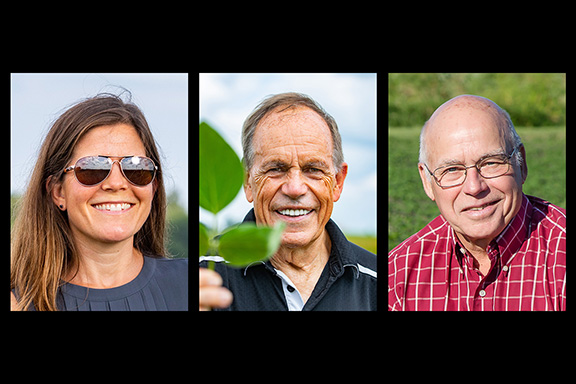Bill and Melinda Gates Agricultural Innovations extends RIPE funding with $34M grant

Bill & Melinda Gates Agricultural Innovations has awarded a grant of $34 million to the Realizing Increased Photosynthetic Efficiency project, an international research effort led by scientists at the University of Illinois Urbana-Champaign. In its 10-year history, RIPE has demonstrated large increases in crop productivity in replicated field trials on the university farm.
The grant will support RIPE researchers over the next four years. The project will continue to look for further gains, with a focus on increasing the photosynthetic efficiency of cowpea and soybean, said RIPE director Stephen P. Long, a professor of crop sciences and of plant biology at Illinois.
“Cowpea is a major vegetable protein source for smallholder farmers in Africa,” he said. “We’ll also focus on African cultivars of soybean, a rapidly developing protein and oil source on the continent.”
The grant will support RIPE researchers over the next four years. The project will continue to look for further gains, with a focus on increasing the photosynthetic efficiency of cowpea and soybean, said RIPE director Stephen P. Long, a professor of crop sciences and of plant biology at Illinois.
RIPE has pursued the theory that the process of photosynthesis in crops could be engineered to increase productivity, Long said. “It succeeded in demonstrating three separate engineering approaches to achieve this – each of which showed the potential to produce a more than 20% increase in productivity.” The new grant will expand on this work, accelerating progress to deliver royalty-free benefits to smallholder farmers in sub-Saharan Africa and South Asia.
Originally funded by the Bill & Melinda Gates Foundation; the UK Foreign, Commonwealth and Development Office; and the U.S. Foundation for Food and Agriculture Research; RIPE will continue under the auspices of Bill & Melinda Gates Agricultural Innovations, a not-for-profit subsidiary of BMGF created to leverage global crop science to meet the needs of smallholder farmers in Africa and South Asia.
“We’re thrilled to support such groundbreaking work,” said Joe Cornelius, the CEO of Bill & Melinda Gates Agricultural Innovations. “Optimizing the biological processes of crops has profound implications for small-scale agriculture in developing countries, unlocking improvements in productivity without requiring more inputs from farmers with limited resources.”
About half of the research and development will be conducted by U. of I. researchers, with the remainder provided by subcontractors at the University of California, Berkeley; the U.S. Department of Agriculture’s Agricultural Research Service; the Commonwealth Scientific and Industrial Research Organisation, in Australia; and the universities of Cambridge, Essex, and Lancaster, in the U.K., Long said.
The leadership team at the U. of I. includes Long, deputy directors Elizabeth Ainsworth and Donald Ort, and financial manager Lisa Emerson. Ainsworth, a USDA-ARS research scientist, and Ort are professors of crop sciences and of plant biology. Emerson is the grant program manager at the Carl R. Woese Institute for Genomic Biology, where the RIPE leadership team is based.
The RIPE project and its sponsors are committed to ensuring Global Access and making the project’s technologies available to the farmers who need them the most.
